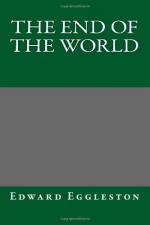All the way to their homes the people disputed learnedly about the “time and times and a half,” about “the seven heads and ten horns,” and the seventh vial. The fierce polemical discussions and the bold sectarian dogmatism of the day had taught them anything but “the modesty of true science,” and now the unsolvable problems of the centuries were taken out of the hands of puzzled scholars and settled as summarily and positively as the relative merits of “gourd-seed” and “flint” corn. Samuel Anderson had always planted his corn in the “light” of the moon and his potatoes in the “dark” of that orb, had always killed his hogs when the moon was on the increase lest the meat should all go to gravy, and he and his wife had carefully guarded against the carrying of a hoe through the house, for fear “somebody might die.” Now, the preaching of the elder impressed him powerfully. His life had always been not so much a bad one as a cowardly one, and to get into heaven by a six months’ repentance, seemed to him a good transaction. Besides he remembered that there men were never married, and that there, at last, Abigail would no longer have any peculiar right to torture him. Hankins could not have ciphered him into Millerism if his wife had not driven him into it as the easiest means of getting a divorce. No doom in the next world could have alarmed him much, unless it had been the prospect of continuing lord and master of Mrs. Abigail. And as for that oppressed woman, she was simply scared. She was quite unwilling to admit the coming of the world’s end so soon. Having some ugly accounts to settle, she would fain have postponed the payday. Mrs. Anderson might truly have been called a woman who feared God—she had reason to.
And as for August, he would not have cared much if the world had come to an end, if only he could have secured one glance of recognition from the eyes of Julia. But Julia dared not look. The process of cowing her had gone on from childhood, and now she was under a reign of terror. She did not yet know that she could resist her mother. And then she lived in mortal fear of her mother’s heart-disease. By irritating her she might kill her. This dread of matricide her mother held always over her. In vain she watched for a chance. It did not come. Once, when her mother’s head was turned, she glanced at August. But he was at that moment listening or trying to listen to




